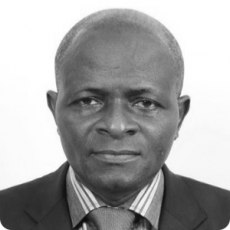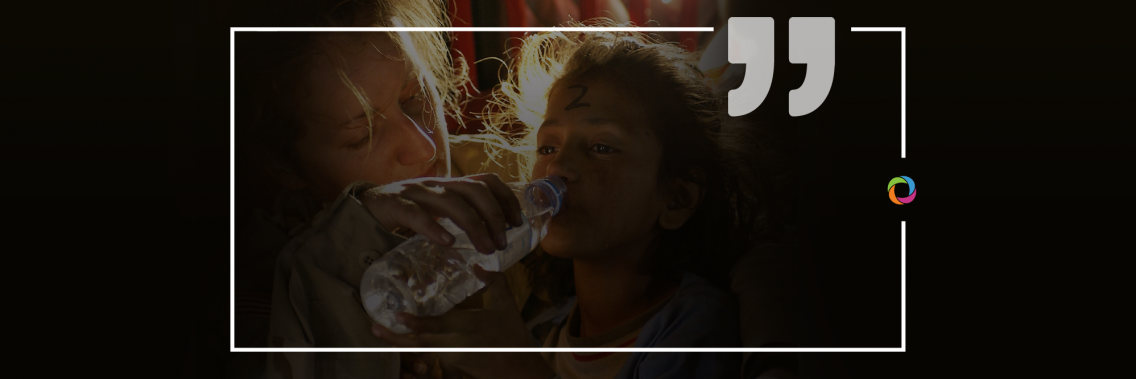Being a Humanitarian Aid worker is not an easy job. It takes drive, courage, good communication skills and initiative. These workers believe they can make a significant impact through their career. Today, we mark World Humanitarian Day – a global celebration of people helping people. On this special day, we would like to inspire you by sharing the experiences of some Humanitarian Aid Workers.
The experience of a humanitarian aid worker in brief…

“My first mission was through an international NGO, Catholic Relief Services, where I worked on the Benin and Togo Program from 2001 as a Community Development Project and humanitarian Assistance Program Manager. I found that I had many roles in Humanitarian activities among which was being involved in managing food assistance, firstly for the relief of vulnerable groups and then subsequently for refugees coming from Togo in 2005-2006. I then trained the dioceses of Benin and Togo in Contingency and Communication Planning in the area of managing food assistance. In 2008, I worked for Plan International WARO in Senegal, Ghana, Burkina and Benin which included evaluating flood responses using the DAC criteria and child-based programming principles. In 2009, I worked as a Program Assistant and implemented a blanketfeeding program in the Atacora Donga department in Benin for the World Food Program (WFP). The hardest situations I have faced during my humanitarian work experience are the state of the rural roads which cause difficulties in the transportation of commodities to vulnerable people and the management of the trauma cases among refugees from Togo (2005-2006).”

“My first mission came unexpectedly in my life while I was a young university student when Hurricane George devastated several states of the Dominican Republic, including the capital city of Santo Domingo. It is in this context that I joined the youth department of the local Red Cross and Red Crescent Movement Society as a volunteer and become involved in the disaster response efforts being put in place. This was my first experience of the reality of an emergency response situation involving communication and information management, shelter needs and logistics, food and supplies distribution, health threats and others. It was a very hard reality but I will always be grateful for being able to help during the response. At that time, I knew nothing about humanitarian aid and disaster management so later on I realized this had been an important educational hands-on experience for me as well. The International Federation of the Red Cross Movement had an office in the same building and during the response joint efforts and support were channeled through it, including experts from the American Red Cross. The IFRC set up an international hotline for the search and rescue of missing persons and this required people with bilingual skills so, after a few weeks working within shelter management, my knowledge of the English language meant that I could serve in that area which also included field deployment to verify contact cases. The hardest situation I have faced during my humanitarian work experience has been watching co-workers fall apart because of personal losses and this can be devastating and challenging.”

“My father had spent over 20 years working in Development Cooperation in Eastern and Southern Africa and each time he returned home from a mission I would listen to his incredible stories. I was so captivated by them that I could even smell the earth of the African plains when he described it. I guess I couldn’t do anything different… cooperation was in my DNA. International Law and a good Master’s degree in Sustainable Development seemed to me to be the path I wanted to follow to learn more about how I could bring a change to our humanitarian and development quests. Difficult situations are always around the corner and, while some of them are so evident that you can plan ahead and perhaps already include in the parameters of your project, others are more subtle and emerge suddenly. These are the unexpected ones, the ones that you need to react to with a snap of fingers and initiate contingency planning. A sudden crisis like flooding can put you in a difficult situation. You might not have sufficient staff and logistics but yet you are called on to intervene to bring emergency relief to those in need.”
What skills are necessary to be a humanitarian aid worker?

“The ability to solve issues quickly and efficiently, and initiative are important skills that organizations look for in humanitarians aid workers. Humanitarians work in multicultural places, facing emergencies and working in conflict zones. All of these conditions require excellent communication skills, both verbal and written. An aid worker must be able to have access to information, analyze it correctly and make the right decisions based on it. The skill of creativity is key to coming up with unexpected solutions. Also, you need to have the ability to follow rules and the capacity to work under pressure. The best way to achieve real results is by working as a team. Humanitarians must deliver aid where it is needed most so they must be adaptable to different circumstances to provide help. To continue delivering aid, one must also have compassion and humanity.”

“In my experience, I find respecting life and solidarity being the important values for a person to feel attracted to becoming a humanitarian worker. It’s a true feeling of wanting to contribute to the relief of others who are facing a harsh life situation that will connect you to serving a purpose and give you the strength during countless stressful and pressured moments. It’s also important to have, at the core, a solid understanding of the standards of humanitarian sectors, the ability to conduct needs assessments, the capacity to articulate effectively within networks, government and other organizations and to undertake rapid decision making. In terms of soft skills, last but not least, I can highlight being able to cope with one’s own emotions in order to understand and comprehend others, as well as to perform and sustain an effective teamwork spirit and behavior.”

“I feel there are some key skills that are common to all: resilience to stressful environments, patience, stealth, ethical and moral integrity, impartiality and commitment. If you have these then you’re on the right path… if you don’t, then that is an opportunity to learn! Learning is another great skill, the capacity to recognize your own gaps that need filling or simply just an interest in grasping a new understanding!”
What are some of the things a humanitarian aid worker should give up?

“Making assumptions – we must always check to make sure that everyone knows what’s happening and why. Creating awkward cultural moments -the best way to avoid these is to learn about the cultural specifics in advance and know how to handle such moments gracefully. Knowing better – rather than rolling in with ready-made solutions, ask the locals what they think, what they need and how they would solve their problems. Skipping the context – for successful and sustainable global development, we must focus on the local context. Not asking for help – asking for help when needed can avoid bigger mistakes in implementation and delivery. Mistaking pity for compassion – it’s important not to make the mistake of confusing compassion and pity. Skipping security – it’s important always to follow security protocols. Ignoring the rules – to ensure that projects function properly and are sustainable, we must adhere to the rules. Not taking time off – it is important to be healthy, both physically and mentally, in order to deliver aid. Becoming a humanitarian for the wrong reasons – if we choose to become an aid worker, let’s do it for compassion and the dream of helping others.”
What is your advice for those who want to follow your path?

“Firstly, try getting involved in local responses so you get a sense of the action and what it’s like in a context to that is familiar to you. After that, you will be able to make better informed decisions about future actions you decide to pursue. Humanitarian work does not only involve only emergency responses so try to participate in interventions that also address other stages of the DRM cycle, such as reconstruction and prevention for example. Become a volunteer or, if you work at an organization in disaster management, make sure to participate in local or international networks of institutions in the humanitarian aid sector to articulate actions and to share information or resources.”

“For anyone interested in stepping into this world I would say: Follow your gut instinct but commit with integrity! People and nature are connected by a special bond: life. Once you step in, you also connect with these elements and become part of that which is very much the essence of the humanitarian world: bring relief, save lives, save the people, save the environment.”
Check out more than 370 job opportunities in the humanitarian aid sector here.

